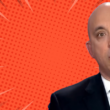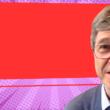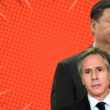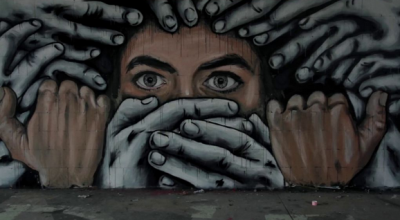The truth is – words are dangerous.
Words are the catalysts of all action – good or evil. To start with a cliché but solid example: words inspired millions of Germans to direct their ire towards Jews, Romani, LGBTQ and other state-labeled “degenerates.” Words inspired the Manson family to murder innocent people. Words inspired the murder of entire villages of Vietnamese, Afghan, and Iraqi civilians. Words convinced thousands of colonizers that this land was their land and that the native people were nothing but mere savages to be removed by force in the name of a pearly white Manifest Destiny. Words inspire millions to hate people they’ve never met based purely on factors of geography, race, religion or culture.
From the simplest task of picking up a pencil to murdering someone, actions are driven by thought which is chiseled and given a coherent shape by words.
A big problem with the free speech argument is that speech is not often given its fair due, and is underestimated as something easy to ignore. And for many, perhaps it is easy to ignore. For someone well educated and surrounded by like-minded folks, it can be easy to cast off inanities like “Jews eat babies – they must die” or “The only good Indian is a dead one.” It’s so absurd, so anachronistic that it seems unrealistic to give this drivel a second thought. But many folks give these words more than a second thought. They marinate their minds in this toxic stupidity. And these words have violent consequences. It is not hyperbolic to say that people have died at the hands of these words. Anyone whose perused the likes of The Protocols of the Elders of Zion and its more famous follower Mein Kampf would be hard pressed to say that words don’t elicit violence.
So of course, the question is – where do we draw the line as a society? Where can we say that this is too far, and right before that is protected? I’ll go ahead and say here that I don’t have the answer. Rather, the point of this essay is to ruminate on the question – and in that way, build an answer together that is less based on hard and fast laws than upon countering violent lies and upholding the rights of the oppressed.

So, first things first: what is violence? Say we want to draw the line at speech that calls for violence, well then we have to define violence. Take for instance the so-called “Riot Boosting Act” that nearly passed in South Dakota following the DAPL protests a few years ago. The idea was that if anyone so much as retweeted a message of support for protests that ended in the destruction of property, they’d be liable for damage and could face criminal charges for “boosting” a riot. In this case, it’s clear that the authors of the bill define violence as a destructive act against an inanimate object such as a pipeline, a piece of equipment, a vehicle, etc. However, as many writers have pointed out – from Bertol Brecht to Vicky Osterweil – this definition of violence is used purely to mask the violence of the state, and instead cast the resistance to that violence as an affront to the peaceful and well-lubricated machinations of a self-proclaimed democratic system. In a word, that’s bullshit. And it not only demands that we define violence in relation to the state, but define our resistance to that state.
To begin with the former question, in obvious terms, war is violence. Police brutality is violence. The prison industrial complex is violence. In less obvious but no less painful or oppressive terms – poverty is violence, as is the lack of access to healthcare – forcing millions to die painful and totally avoidable deaths. Climate change is violence – the poisoning and destroying of our planet, which of course directly affects our ability to exist. All of these examples are state sponsored, and deeply embedded in the DNA of our country.
What then is our response to this violence? Particularly for those who have seen state violence first hand, it’s not that hard to cast aside the idea that property destruction is synonymous with violence towards a person, but can we go further? As Slavoj Zizek writes in the Foreword to Sophie Wahnich’s book In Defence of the Terror, “…one cannot separate violence from the very existence of the state (as the apparatus of class domination): from the standpoint of the subordinated and oppressed, the very existence of a state is a fact of violence. In this strict sense, every violence of the oppressed against the ruling class and its state is ultimately ‘defensive.’” In other words, the oppressed always have a right to self defense. And even the law of this facocked nation (at least on paper – in practice, this is highly shaped by race and class) recognizes the difference between self defense and an offensive attack.
To be sure, I could discuss, and have discussed, this topic much more than I am here, but for the sake of circling back to the issue of free speech, let’s define violence as a destructive act aimed at harming a person (again, I would include all our ecosystems in this definition but it’ll be more streamlined to focus on homo sapiens for this particular essay).
Let’s say that we want to draw the line at speech that incites violence, calls to action to harm, maim, kill, or otherwise oppress people. While hate speech (offensive speech directed towards someone based on that person’s race, religion, sexual orientation or gender) isn’t illegal, speech that directly threatens someone can be. For instance a 1969 US Supreme Court Case Bradenburg v. Ohio ruled that the KKK can speak in favor of violence towards marginalized folks so long as it doesn’t directly encourage people to engage in “immediate” violence. Now, you might read that and think – well shit, what’s the difference? Indeed, this is a very murky area, not just legally (and I say that as someone who doesn’t respect the law simply because it’s the law) but ethically. There’s a lot at play in a court case like this, not least of all the deep systemic racism that still sees BIPOC (black, indigenous and people of color) as second class citizens, at best. And if we once more consider how words lead to thought lead to actions, how can such a distinction as was made in the ’69 court case hold up? You could easily make the case that it doesn’t.
But before we get inextricably tangled in a web of bigotry and speech, let me offer up a sidestep palette cleanser that might give us some food for thought on censorship. If you were alive back in the 60s you would’ve seen a lot of cigarette ads calling out to you in public places and in media: the chic laissez-faire of their spokespeople – like rebel sirens in the midst of a banal sameness. In the earlier half of the 20th century, cigarette companies particularly interested in picking up female smokers ironically sold a painfully chic modern woman complete with a trim frame, no wrinkles and better moods lighting up a balanced blend of safely rebellious and nonchalantly sexy. Later on, kids were specifically targeted – because well, capitalism. Start ’em young and you’ve got a full lifetime (albeit a shorter lifespan) of repeat consumption.

Following the Surgeon General’s Report on the health effects of smoking in 1964, things started to shift. Indeed, it became quite a battle – with huge fights on whether or not cigarette companies could sponsor events, put up ads close to schools or in media specifically made for youth (including cartoons), etc. In the end, as you may have noticed, cigarette ads almost vanished entirely. By the turn of the century, cigarette ads were banned on billboards, transit ads, TV and radio. As a society, we decided that advertising cancer sticks wasn’t who we wanted to be. Now, this didn’t make it illegal to smoke. It didn’t make it illegal to show good looking people like Brad Pitt smoking in a movie. It didn’t even make it illegal to smoke in the vicinity of a school, or in front of your kids. But it did censor the cigarette companies in the public sphere. It did shut them up to the point where we’ve shifted the cultural acceptance of smoking from something ubiquitous, cool and sexy to something more rare and frowned upon (depending on which circles you run in).
Of course, you could make the argument that ads are not the same as free speech; that a cigarette company isn’t covered under the 1st amendment because it’s not a person. But then you’d probably also be unaware that according to our laws, corporations are granted personhood rights including those around speech. Alternatively, you could make the argument (and rightly so) that comparing cigarette ads to the KKK reminiscing about lynching people is not the same. Of course it’s not. The example of cigarette ads is useful in bringing up the issue of speech in the public sphere. For instance, having a racist mumble to himself in his living room is not the same thing as having a racist on national television advertising his blend of stupidity and hate to the world.
So, if we make the distinction between public sphere speech and other speech, how and where do we draw the line on shutting down speech that aims to harm and/or oppress? A big conversation here has of course been about the digital world, from QAnon to Trump’s twitter account. When Trump threatens nuclear war with North Korea, should that be deleted by Twitter? When someone sends me a furiously misspelled message about how I should be violated and murdered due to my Jewish heritage and affinity for justice, should that be deleted and the sender banned? And if so, who decides that? Who watches the watchers?
That last question is vital as we have seen dozens of progressive and leftist pages and accounts deleted and banned in the past few years. Many of these bans followed the much-celebrated shut down of right wing loony tune Alex Jones. When this happened, a few of us on the left didn’t cheer. We knew what this shut down meant – what it was lubing folks up for. Sure enough, as progressive and leftist sites soon followed in a sweep of censorship, the more liberal leaning crowd was wary of decrying these actions lest they have to publicly wrestle with their conflicting viewpoints on censorship.
Still, the argument shouldn’t have been a difficult one if we look at the reasons for the ban. The excuse for banning Jones came down to false information – something Jones definitely peddles. But when the state gets to decide who tells the truth and who lies, you very quickly find yourself in a quagmire of fascist propaganda. And lo and behold, the Jones excuse was later copy-and-pasted for leftist sites who the censors claimed (wrongly) were peddling lies and “fake news.” Meanwhile, the behemoths of fake news like Fox and CNN continued to spew objectively false information (from the more obvious snafus like Russiagate and WMDs to the silencing and torture of Julian Assange to the connection between climate change and imperialism) from their protected pedestals of propaganda leaving many folks to assume they must have it right – because clearly if they didn’t, they’d be shut down same as Jones and those radical leftist sites.

Beyond the danger of the state claiming a monopoly on truth, moves like this muddy the water between “fake news” watchdog groups (often fans and protectors of fake news themselves) and crusaders against hate speech. Banning a site that criticizes cops only fuels the fires behind absurdities like “Blue Lives Matter” as if a blue person is a thing, and as if legitimate critique and outright hatred of killer police is synonymous with the hatred of people based on the level of melanin in their skin.
————–
Ultimately at the core of the free speech issue are three things: the power of words, power dynamics and the public sphere. The first is really mandatory if we’re even gonna talk about free speech or speech in general. If we can’t agree on the simple fact that words are heavy – and have the potential to manifest great or terrible actions – we can’t have an honest conversation about protected speech.
As concerns the second point, we have to consider the hierarchies at play in any decision to censor. Who does this protect? Who gains? Activist comedian Lee Camp is censored precisely because he punches up – at the system itself – rather than punching down at poor people, immigrants, women, LGBTQ, etc. This censorship protects the state – just like the banning of antiwar or anti-police Facebook pages like Police The Police, Free Thought Project, and Anti-War.com. Those who gain are the ones already in power, the oppressors. As a part of the power dynamics consideration, we must also look at the goal of the speech. For instance, the goal of fascists who threaten me and those in my community is to do us harm based on our very existence. My goal as an antifascist is to protect my community by any means necessary, including self defense against the ideas of fascism, and those who defend them. In other words, is your goal violence or self defense?

These questions of power dynamics and goals leads to that final point of the free speech argument: the public sphere. First off, it’s important to recognize the limitations of public sphere censorship. A classic example is that of Germany and Austria, where pro-Nazi or Holocaust denial speech is illegal. Unfortunately, neo-Nazism is on the rise in Germany, just as it is across Europe. Limiting the amplification of stupid ideas doesn’t mean they’ll die, particularly if you make fertile ground for them in a toxic flowerbed of neoliberal policies. As international human rights activist and political analyst Ajamu Baraka succinctly pointed out recently, “Neoliberalism is fascism. If you are really concerned with fascism work to destroy its source – the colonial/capitalist system.” We’ll obviously never see the end of colonial and capitalist violence – or the public speech that drives it – so long as those systems rule, so the core work of battling such dumbshit ideas must come outside the confines of censorship.
Still, we can and should make the case for fighting back against the pedestaling of certain speech, like demanding that fascists not have a platform of colleges and universities. A few years back I saw that CNN was airing a panel about the alt-right but for passing viewers, the only thing they’d notice was that the lower third of the screen read “Are Jews People?” That question shouldn’t be up on a screen on national television. Should someone be allowed to publish it on their blog? Sure. Should someone be allowed to write a book about it? I mean it’s already been done so it’s a bit hack, but sure. Should we allow public ads for that book? I say no.
I can’t stop anyone from visiting that blog or getting that book. But I can work for a system that doesn’t uphold questioning a person’s humanity based on religion/culture. For those who want to stop the book or blog from existing, I do feel that. But again, you won’t kill the idea. And rather than trying to whack-a-mole every fascist blog or tweet, a greater effort must be placed on killing these ideas before they ever take root. Some might call it education but I think we could even narrow that down to media literacy and community organizing. Yes, this country has a shit education system that at best seeks to turn out unquestioning proles and at worst creates monsters who crusade in the name of the empire and its almighty dollar. But while there are those who admirably work to reform an entire education system, we can do much besides. I know plenty of folks who are products of some of the worst public school systems in the country who are avid truth tellers, readers and seekers. Our work then should be focused on inspiring people to question what they hear – to dig beyond headlines, catchy click bait, and engaging blogs that suggest this skin color is better than that. I would also say a requisite companion is building community – sharing stories outside the confines of what corporate media spews, digging up censored stories – the good and the bad – discussing them and detailing why this is dumb, why that is not, why that is fact, why that is not, etc. In these spaces, we also learn from each other – debunking by connecting – creating fertile ground for grassroots power instead of neoliberal isolation.
In short, the best defense against fascism we have is not censorship, it is critical thought. This critical thought will lead to critical actions – and those critical actions will protect us from the fascism already in our midst.
That might sound vague but as I wrote earlier, I don’t come with cut and dry answers. Indeed, the deeper one gets into this issue, the more it seems that there isn’t a single line to be drawn. The fact might be that a one-size-fits-all approach is the antithesis of a just society, as I’ve argued recently on my podcast episode titled “The Problem With Equality.” Equity demands that we consider the context of a situation in order to approach it with a just solution. As an example, this idea has been very key in addressing ableism and how to ensure people with diverse disabilities have what they need to not only survive but to thrive. And maybe that’s why our current system can’t (or won’t) get it right. Not only is the wellbeing of the people of no concern to the system, but the idea that what’s best might require nuance flies in the face of the streamlined and binary paradigm to which the system adheres.
This should not discourage us from discussing solutions – far from it. To leave anything we need to the state is in fact a fool’s errand. Rather, this should push us to actively pursue solutions, knowing that any solution crafted by the state will not be for our benefit. At best, it will be a justice window dressing – at worst, a move to censor those who do not toe the line of the empire (which as noted above, is already happening). Indeed, if you only take one thing from this essay, take this: the longer we argue about free speech within the confines of a system that allows for neither nuance nor justice, the longer we will fail to find solutions that deliver justice and freedom. Outside the confines of existing law, outside the confines of reformist bickering, we can together build answers that uphold the rights of the oppressed and counter violent lies through the censored arts of critical thinking and community building.
—
If you think this is important, please share it. You can also support Eleanor Goldfield’s work and sign up for her free email list at ArtKillingApathy.com





Most important shoulda been in the opening:
“We’ll obviously never see the end of colonial and capitalist violence – or the public speech that drives it – so long as those systems rule, so the core work of battling such dumbshit ideas must come outside the confines of censorship.”
Thus free speech can’t exist as dumb gets amplified and the reasoned approach ridiculed. Murdoch perfected giving voice to idiocy, he’s a clever men, took me till my 30’s to figure out why he did it…
Slight aside (equality), when I was young we (AU) closed all the big institutions the result is a fucking disaster that never gets spoken of. Today it’s harder to be deemed intellectually/mentally disabled harder to get accommodation each CRU accommodates 5 people costs millions to build and run but they are just mini institutions without the actual benefits of being one but the government points to them as shining lights of their goodness see look how much we are spending and it sates most. Since the 80’s we keep closing beds across the board – mental health, public hospitals are getting smaller, private bigger and as we’ve destroyed our economy, due to so many becoming rent seeking sociopaths, it keeps getting worse. So yeah equality is only for those that can afford it, in my lifetime we’ve gone from being a fairly equal country with possibly the largest sovereign wealth (except for our indigenous brothers and sisters) to deep divide and no assets with the public domain in tatters, shit most don’t even know what that means, this is mostly due to the ‘left’ political parties not the right. Shit hasn’t been a Uni sit in for decades they used to be weekly events, last successful strike was for nurses with the trade off being they went from being a trade to a profession and totally abandoned unity with ancillary workers.. I’m rambling, Tootles
following Google’s Duplex announcement portends, S.B. 1001 is only the beginning as far as AI- and bot-labeling proposals go. Bot-labeling raises complicated legal and ethical questions. As policy makers across the country begin to consider these proposals, they must recognize the free speech implications of across-the-board bot labeling mandates and craft narrowly-tailored rules that can pass First Amendment scrutiny.